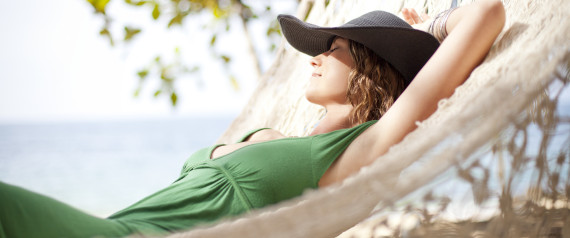
By Valerie Frankel
I should have been excited for my upcoming trip to Fiji -- and I was -- but as a chronic insomniac, I was worried about not getting any shut-eye while I was there. I was especially nervous about the long flight, so I packed some sleeping pills. When the pilot dimmed the cabin lights, I reached into my backpack for one of my little helpers -- but I couldn't find the pill vial. Without my crutch, I fretted and sweat for the entire 10-hour flight, anxious that my insomnia would ruin my vacation. There was no corner Rite Aid in the South Pacific. Much to my shock and relief, though, I slept well while away. The first night was touch and go. But by the third, I floated off to dreamland on a coconut cloud and woke up as refreshed as the smiling, white-camisole-clad ladies in the mattress ads on TV.
I credited the healthy Fijian diet of fish and fruit with my new talent for nodding off. But a friend told me she'd experienced a similar phenomenon while in Paris eating foie gras and cheese. "Apart from caffeine and alcohol, diet doesn't strongly influence sleep," says Kelly Glazer Baron, Ph.D., assistant professor of neurology and director of the Behavioral Sleep Medicine Program at Northwestern University. I hadn't given up coffee, so how to explain my miracle transformation? According to experts I quizzed afterward, several things I did on my trip likely improved my sleep -- and they're habits you can steal to snooze more soundly in your own room.
Change up your surroundings.
Unfamiliar beds can give good sleepers a bad night, but for insomniacs, they can blunt the worry that contributes to sleeplessness. "The mattress and sheets are different from what you're used to, so you don't associate them with staying awake like you might at home," says Robert Oexman, a chiropractor and director of the Sleep to Live Institute in Joplin, Mo. In Fiji, I also enjoyed silence -- a pleasure lacking amid the sirens in my Brooklyn neighborhood. (Another thing I didn't hear? My snoring husband, who stayed in New York.)
Unfamiliar beds can give good sleepers a bad night, but for insomniacs, they can blunt the worry that contributes to sleeplessness. "The mattress and sheets are different from what you're used to, so you don't associate them with staying awake like you might at home," says Robert Oexman, a chiropractor and director of the Sleep to Live Institute in Joplin, Mo. In Fiji, I also enjoyed silence -- a pleasure lacking amid the sirens in my Brooklyn neighborhood. (Another thing I didn't hear? My snoring husband, who stayed in New York.)
Pitch-black darkness is just as foreign to me. A study in the Journal of Environmental Management found that people who lived in areas with a lot of artificial light outside -- from lampposts, bright signs -- reported a decreased quality of sleep compared with those in less-lit areas. The reason: Light lowers our body's production of melatonin, a hormone that regulates our sleep-wake cycle and makes us drowsy. On the island, the only evening light in view was the moon.
Try this at home: Change your sheets a little more often. "New" bedding, even if it's your own, can defuse the fear of another sleepless night. And invest in a white-noise machine (or download the SimplyNoise app for a buck) and hotel-style blackout shades.
Turn down the thermostat.
Most hotel rooms are icy cold, and that's optimal, Baron says: "We sleep best when our body temperature is declining." It's especially true for insomniacs, who tend to have a higher core body temperature at bedtime, according to a study in the journal Sleep Medicine Reviews.
Most hotel rooms are icy cold, and that's optimal, Baron says: "We sleep best when our body temperature is declining." It's especially true for insomniacs, who tend to have a higher core body temperature at bedtime, according to a study in the journal Sleep Medicine Reviews.
Try this at home: Set the thermostat between 60 and 68 degrees, Baron advises. "Another trick is to take a bath an hour before you go to bed," she says. "When you get out, your core temperature will drop."
Get plenty of sun and exercise.
Time for a technical term: Scientists refer to anything that keeps your circadian rhythms in sync as a zeitgeber. A powerful one is sunlight, which is usually in abundant supply on vacation -- whether you're in a sunny locale or exploring a city. When researchers at the University of Colorado at Boulder monitored a group of campers who were outside all day, they found that the vacationers awoke and drifted off at the same time every day by the end of the trip, no matter when they normally did at home.
Time for a technical term: Scientists refer to anything that keeps your circadian rhythms in sync as a zeitgeber. A powerful one is sunlight, which is usually in abundant supply on vacation -- whether you're in a sunny locale or exploring a city. When researchers at the University of Colorado at Boulder monitored a group of campers who were outside all day, they found that the vacationers awoke and drifted off at the same time every day by the end of the trip, no matter when they normally did at home.
Another vacation-friendly zeitgeber is exercise. In a Stanford University School of Medicine study, working out for 20 to 30 minutes every other day reduced the time needed to fall asleep by half. (One caveat: No vigorous exercise within three hours of bedtime or you might jack yourself up instead of knocking yourself out.)
Try this at home: Exercise outdoors, ideally early. Most of us spend our days inside; that throws off our sleep-wake cycle. "Morning sunlight helps you feel more alert," Baron says.

No comments:
Post a Comment